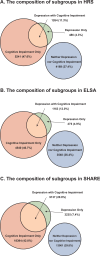Effects of depression and cognitive impairment on increased risks of incident dementia: a prospective study from three elderly cohorts
- PMID: 39379348
- PMCID: PMC11461656
- DOI: 10.1038/s41398-024-03125-1
Effects of depression and cognitive impairment on increased risks of incident dementia: a prospective study from three elderly cohorts
Abstract
Depression is usually accompanied with cognitive impairment and increases risk of incident dementia. However, evidence has been limited on the effect size of depression with cognitive impairment and their synergistic effect on future dementia. To explore this, we examined three large cross-country population-based prospective cohorts. Depressive symptoms were assessed by epidemiologic scale, while cognitive impairment was defined by subjective cognitive tests. Dementia was ascertained by self-reported physician-diagnosed conditions. Cox proportional hazard models were employed to determine the hazard ratio (HR) and 95% confidence interval (95% CI), with adjustments of potential confounding variables. Addictive and multiplicative interactions were calculated to evaluate the synergistic effect. A total of 64,706 participants were included at baseline (mean age: 63.9, female: 55.2%), where 4197 (6.5%) individuals had depressive symptoms only, 28,175 (43.5%) individuals had cognitive impairment only, 11,564 (17.9%) individuals had both, and 20,770 (32.1%) individuals had neither. Compared with the neither group, all the other three groups had higher risks of subsequent dementia (depression only: HR 1.65, 95% CI 1.26-2.17; cognitive impairment only: HR 2.71, 95% CI 2.33-3.14; depression with cognitive impairment: HR 3.51, 95% CI 2.95-4.17). There was insignificant additive (RERI, 0.15, 95% CI -0.45-0.75; AP, 0.042, 95% CI -0.13-0.21; SI, 1.06, 95% CI 0.83-1.37) and multiplicative (0.78, 95% CI 0.58-1.06) interaction between depression and cognitive impairment on subsequent dementia. We found depression with cognitive impairment has higher risks of dementia than either condition alone and no significant synergistic effect exists between these two factors.
© 2024. The Author(s).
Conflict of interest statement
The authors declare no competing interests.
Figures



References
-
- Xu W, Tan L, Wang HF, Jiang T, Tan MS, Tan L, et al. Meta-analysis of modifiable risk factors for Alzheimer’s disease. J Neurol Neurosurg Psychiatry. 2015;86:1299–306. - PubMed
Publication types
MeSH terms
LinkOut - more resources
Full Text Sources
Medical

